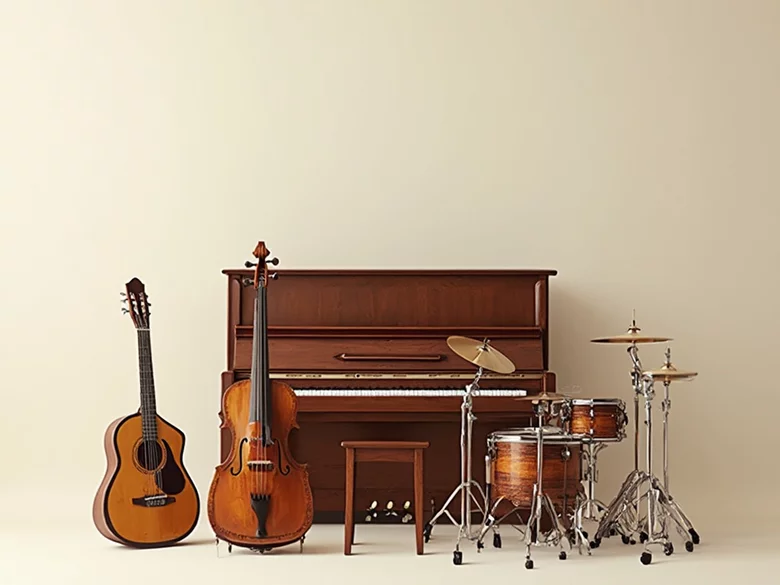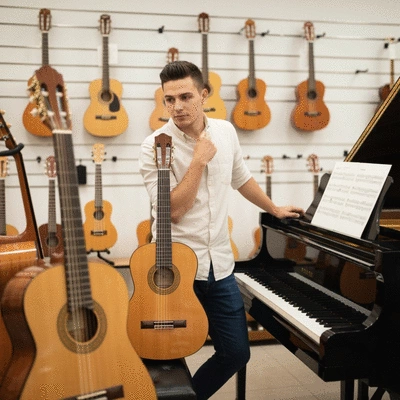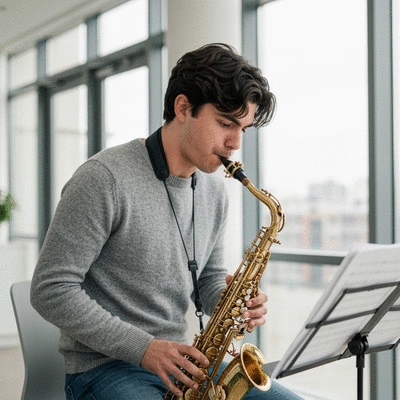Acoustic Guitar
Price Range: $150 - $800
Brands: Yamaha, Fender
Starting your musical journey can feel like stepping into a new world filled with endless possibilities. With so many instruments to choose from, making the right choice is vital for igniting a lifelong passion for music. What key factors should you consider to ensure your first instrument resonates with you?
This table outlines popular beginner instruments, their typical price ranges, and recommended brands, providing a quick guide for new musicians. For a deeper dive into specific options, consider exploring our guide to the best guitar shops in Melbourne.
Price Range: $150 - $800
Brands: Yamaha, Fender
Price Range: $200 - $1,200
Brands: Squier, Epiphone
Price Range: $30 - $300
Brands: Kala, Mahalo
Price Range: $400 - $2,000
Brands: Yamaha, Casio
Price Range: $100 - $1,000
Brands: Stentor, Cecilio
Choosing your first musical instrument is an exciting yet daunting task! The right choice can set the foundation for a lifelong passion for music. At Best Music Shops Australia, I often hear from parents and new learners about the importance of finding an instrument that resonates with their needs and interests. So, why does selecting the right instrument matter for new learners?
Every new musician's journey begins with a choice, and this choice can have a lasting impact. Picking an instrument that feels comfortable and enjoyable is crucial in maintaining motivation. If a child loves the sound of a guitar, they are more likely to practice regularly and develop their skills. Have you ever thought about how much easier it is to stay engaged with something you love?
Moreover, the right instrument can help prevent frustration. A poorly matched choice may lead to discouragement and a potential loss of interest in music altogether. It's vital to consider how each instrument speaks to the individual learner’s preferences and comfort levels.
When selecting the perfect instrument, several factors come into play. Age is a significant consideration; younger learners may benefit from smaller instruments, while older beginners might be ready for something more robust. Each instrument has its own unique physical requirements, and we want to ensure learners can handle their choice comfortably. For those looking for local options, our guide to the best music shops in Sydney offers excellent starting points.
By taking these factors into account, you can help pave the way for a successful musical journey. Don't forget that personal preferences play a crucial role, too! Have you had any memorable experiences influencing your choice in music?
Now that we've placed importance on choosing the right instrument, let’s dive into some popular options available in Australia. Each of these instruments has its own unique advantages, and I can’t wait to share them with you!
With so many exciting choices, it’s easier than ever to find an instrument that fits like a glove!
As you embark on your musical journey, we would love to hear from you! Which instrument are you considering for your first musical experience? Choose one from the options below:
Starting your musical journey can be exciting, but it often comes with its own set of challenges. As a passionate musician myself, I’ve encountered my fair share of hurdles, and I remember how daunting it felt at times! In this section, we’ll explore some common challenges and provide practical advice to help you overcome them.
One of the first hurdles new musicians face is finding an instrument that physically suits them. Whether you're a child or an adult, proper ergonomics are crucial for comfortable playing. If the instrument feels awkward, it can lead to frustration and even physical discomfort!
Don’t hesitate to visit your local shops, like those featured on Best Music Shops Australia, where you can try various instruments in person. This hands-on experience is invaluable!
Another common challenge for beginners is maintaining motivation during practice. I know how easy it can be to lose steam, especially when progress seems slow. Here are some tips to keep your spirits high:
Remember, every musician started somewhere. Celebrating your successes, no matter how small, can help you stay engaged and excited about learning!
While it may seem daunting, having a basic understanding of music theory is essential for any musician. It serves as the language of music and helps in various aspects of your learning journey. Here’s what to focus on:
Don’t be afraid to ask for help, too! Many local music shops offer lessons or workshops that can demystify music theory for you. For advanced learners or those seeking premium instruments, consider exploring our list of premium music stores in Australia.
Finally, connecting with fellow musicians can greatly enhance your learning experience. Community music programs provide not just a chance to improve your skills but also to build friendships. Here’s how to get involved:
Engaging with others who share your passion for music can provide motivation and encouragement along your journey!
As you consider embarking on this musical adventure, understanding the financial aspect is essential. Budgeting can seem overwhelming, but with a little planning, it can be manageable and even enjoyable!
When deciding to purchase or rent an instrument, it’s important to analyze what fits best within your budget. Here are some factors to consider:
I recommend checking out local retailers featured on Best Music Shops Australia to find the best deals!
Don't forget to budget for essential accessories that can make learning easier and more enjoyable! Here’s a list of must-haves:
Investing in quality accessories can really enhance your learning experience and help you grow as a musician.
Lastly, understanding the price ranges of instruments can help with your budgeting. Here’s a general overview:
| Instrument | Price Range | Recommended Brands |
|---|---|---|
| Acoustic Guitar | $150 - $800 | Yamaha, Fender |
| Electric Guitar | $200 - $1,200 | Squier, Epiphone |
| Ukulele | $30 - $300 | Kala, Mahalo |
| Piano | $400 - $2,000 | Yamaha, Casio |
| Violin | $100 - $1,000 | Stentor, Cecilio |
This table gives you a quick glance at what to expect while shopping for beginner instruments. Always remember to try before you buy when possible! For additional advice on making informed purchases, consult our guide on choosing the right instrument.
Here is a quick recap of the important points discussed in the article:
A: Choosing an instrument that feels comfortable and enjoyable is crucial for maintaining motivation, ensuring consistent practice, and preventing frustration, which can lead to a lasting passion for music.
A: Key factors include the learner's age (some instruments are better for younger children), physical attributes (size and reach), and musical preferences (the type of music they enjoy).
A: Popular options include acoustic guitar, electric guitar, ukulele, piano, violin, drums, and harmonica, among others like flute and clarinet.
A: Challenges include physical ergonomics (choosing an instrument that fits comfortably) and maintaining motivation. These can be overcome by testing instruments, setting small goals, incorporating fun songs, and connecting with other musicians.
A: Rental fees are lower upfront and great for beginners to try an instrument. Purchasing can be more cost-effective long-term if the learner plans to stick with it. Consider local shops offering rental programs.
A: Yes, a basic understanding of music theory is essential. It acts as the language of music, helping with reading notation, scales, and chords, and can be learned through online resources or local courses.
At Best Music Shops Australia, we're your ultimate guide to discovering top-rated music stores nationwide. We connect musicians, hobbyists, and parents with the perfect instruments, gear, and lessons.
Australia-wide musical discoveries


